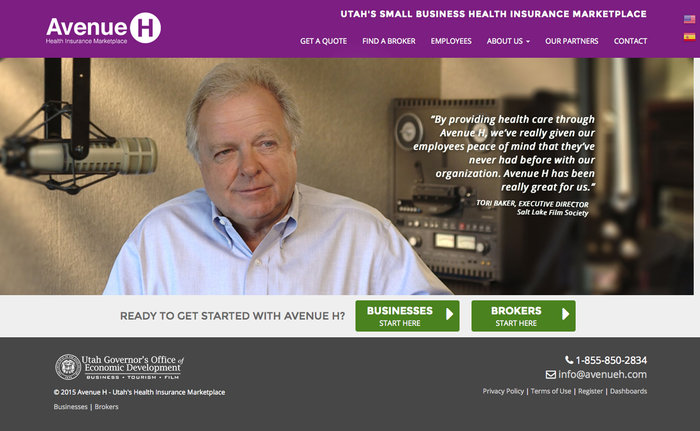Entering its sixth year, Utah’s small-business health insurance marketplace still has less than 2 percent of eligible employers participating.
Entering its sixth year, Utah’s small-business health insurance marketplace still has less than 2 percent of eligible employers participating.
Avenue H, an online marketplace for companies with fewer than 50 eligible full-time employees, allows their employees to browse healthcare plans to find the best fit for them and their families.
Patty Conner, director of the Office of Consumer Health Service, which manages Avenue H, recently told the Governor’s Office of Economic Development (GOED) board that only 698 of the 38,000 eligible Utah companies are participating. Avenue H was hampered by not having money for advertising in its first few years, although it now has federal grant money to use for marketing. The office is part of GOED but the state Legislature has been hesitant to provide marketing funds for Avenue H, she said.
“But I still don’t think people get the concept of a marketplace when it comes to health insurance,” Conner said. “They’re used to it for travel agencies or Amazon, but they still haven’t figured out how it’s going to work in the health insurance side.”
Mel Lavitt, the GOED board chairman, suggested that Avenue H officials should work with economic development organizations and others to “spread the word” about its offerings.
“It’s a great program and one where you’d be surprised that it’s in Utah and not some other states, but I really think that it would be helpful to figure out how to get people to really understand it,” Lavitt said.
Avenue H offers a choice from among 70 medical plans from three insurers, 33 dental plans from four insurers, plus three health savings account administrators. As of Oct. 1, the 698 employers covered 5,485 employees and nearly 14,400 total enrollees. It has a monthly growth average of 2.5 percent. Nearly all, 94 percent, of companies use a broker, and Avenue H has an 85 percent retention rate among participating companies.
For comparison, California’s system has 2,865 employers and 19,465 enrollees; Vermont has 3,900 companies and 38,065 enrollees; Rhode Island has 562 companies but only 3,956 enrollees. New York has 29,000 enrollees and the District of Columbia has 21,000.
“We’re actually a lot of the envy of other states that are trying to figure out ‘what can we do to make our shops work?’” Conner said. “When you look at where we’re at, we’re actually doing great compared to everybody else. I have had numerous calls with other states, asking about our technology, our marketing, our solutions and how we’re able to do it so effectively.”
Conner said Utah’s small businesses might be shying away from Avenue H because of “transitional relief” in the Affordable Care Act that allows people to retain their healthcare plans for up to three more years. Avenue H also is not offering incentives to lure companies. Those employers can send their workers to the individual marketplace, which is cheaper than going through Avenue H for group insurance, she said.
Increased participation aside, Avenue H faces a few other challenges. One is the loss of Arches Health Plan, currently in receivership. Conner said Arches represents 14 percent of Avenue H enrollees.
Another is the so-called “PACE Act,” which allows states to raise the eligibility threshold to 100 employees, even though the federal standard will remain at 50. Utah currently expects to also stick to the 50 figure.
“So unless the state gets a lot of push from businesses to expand it to 100, we are not able to expand Avenue H to them at this point,” she said. “That’s going to hurt us in our growth, and it’s going to hurt us in being able to help small businesses find alternatives besides going directly to the carriers.”
Another challenge is rate increases kicking in in 2016. Rates for small groups will rise an average of 10 percent, with individual market rates rising 23 percent, on average. Connor said she expects small-group rates to be less than individual rates within a couple of years.
Another possible challenge could occur with a presidential administration change, especially if the new top executive tries to overturn the Affordable Care Act.
Despite being a Utah program, “we’re kind of challenged with everything going on politically with the Affordable Care Act,” Conner said.
“I would have to tell you the things that it’s impacted us most on is confusing employers — businesspeople — on what’s the right thing to do and whether or not this program is going to be around. I think it’s fair enough to say we think our solution is going to be around. How we deliver that solution is going to be a little bit different. It’s going to have to change as the environment changes around us, but it’s still a good concept to provide transparency and a competitive environment to help small employers find a way to offer health insurance.”
Read more:The Enterprise - Health insurance marketplace participation small six years in








